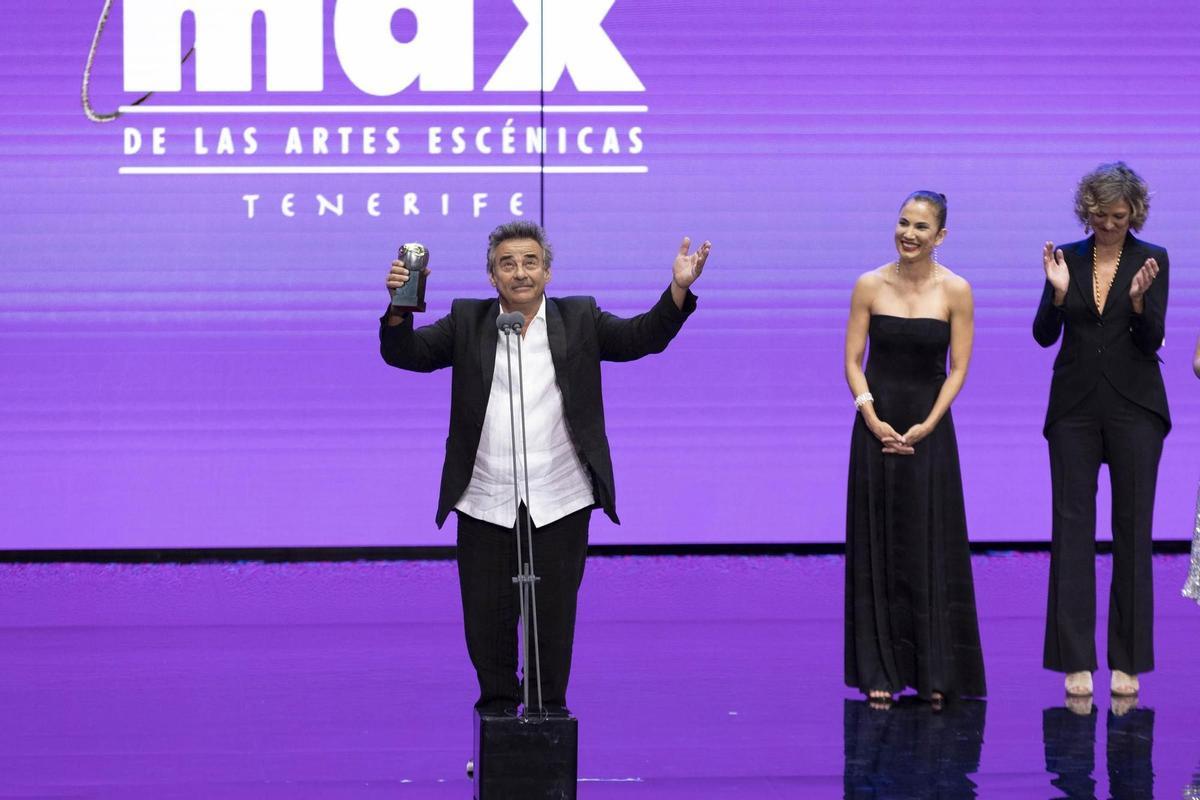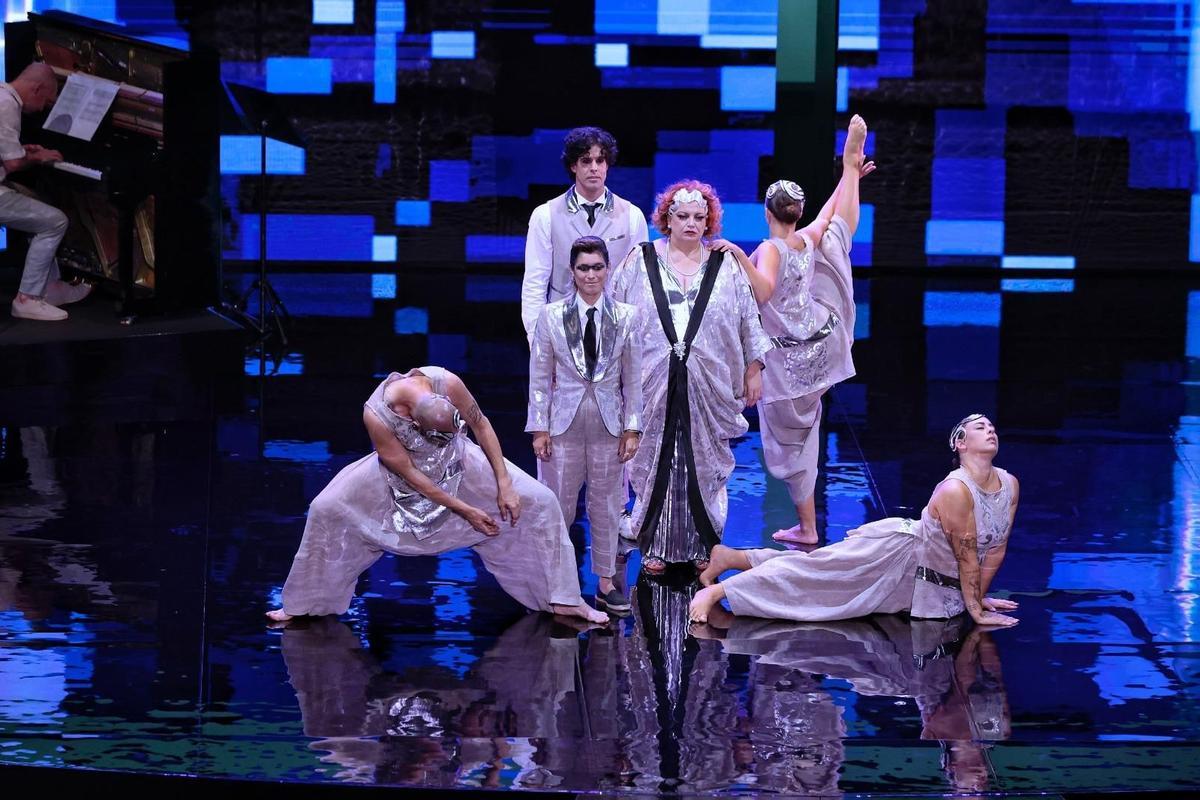The gala of the 27th edition of the Max Awards, held this Monday in Santa Cruz de Tenerife, was a tribute to Canarias, but also to the languages of the State, as had been announced. Without major surprises, and with a narrative thread that traversed the life of the poet and playwright Ángel Guimerá – whose first centenary of his death is celebrated this month – its director, the Canarian playwright José Padilla, articulated reflections on Guimerá’s work based on the artist’s life journey and took the opportunity to make a plea against war based on an episode related to the First World War.
It wasn’t a particularly protest-oriented gala, although some of the winners called for more solidarity to combat the precariousness of the profession and only the president of the SGAE, the organizer of the awards, referred to reports of sexual abuse. Antonio Onetti, president of the General Society of Authors and Editors (SGAE), delivered his speech accompanied on the piano by Juan José Solana, president of the SGAE Foundation. He recalled the 125 years of the organization, and in the midst of his speech, he said: “Today we are not going to talk about the artist’s statute or the complicated situation that dance is facing. Today we are not going to ask for anything”. Solana interrupted him. “Wait, what do you mean nothing?”. Onetti continued: “May there never be another case of sexual harassment in the theatre. May the rehearsal and theatre rooms be safe places for everyone”.
[–>
The Max Awards, promoted and organized by the SGAE, have been the benchmark awards for Spanish performing arts since their inception in 1998. With a fast pace, the Max Awards distributed the awards with some surprises. One of them was the winner of Best Female Performance, which did not go to the top favourite, Vicky Luengo – who had won the Talía a few months earlier – but to Natalia Huarte, thanks to her performance in the play Psicosis 4.48, directed by the dancer, choreographer, and stage director Luz Arcas, who thanked the award for “teaching me to embody and helping me to look in dark places”. Huarte also wanted to vindicate theatre that addresses uncomfortable issues, like the play she starred in, focused on the depression and mental illness of its author, Sarah Kane, who committed suicide a month after finishing the play. “Hopefully, we wouldn’t have to portray these kinds of realities, but theatre also needs to shed light on the dark, we have to dare,” said an emotional Huarte. “Let’s never stop supporting theatre because it helps many people, because it makes us grow,” she added. “We need to broaden our perspectives, get out of our own little world.

Eduard Fernández collects his Max award for Best Male Performance in Tenerife. / EFE
It wasn’t, however, the winner of the same award in the male category, Eduard Fernández, for his performance in Todas las canciones de amor. “Rubén, Pedro,” he said addressing the other two nominees, “it could be for you,” he said before complaining about not having been able to perform his play yet in Catalonia, “but today is a very happy day”. Fernández wanted to dedicate the award to his mother, who suffers from Alzheimer’s, recalling a dialogue between them.
Nor were the two awards that consecrated Iñaki Rikarte for his work in Forever: Best stage direction and Best theatrical authorship (along with Garbiñe Insausti, Edu Cárcamo, and José Dault) a surprise. “Theatre is a collective art, and it’s not bad to remember that when you receive an individual award,” Rikarte said upon receiving the Best stage direction award.
[–>
The most emotional moments
[–>
Miguel del Arco, the director in charge of presenting the honorary award, choked up as he recalled that theatre must be “a space to train empathy” before introducing Núria Espert and after praising her long career. Espert received one of the longest ovations remembered by winners of the Honorary Award and responded to the director’s words, with whom she worked on La violación de Lucrecia, saying that he is “the person outside my family that I love the most”.
The night had kicked off with the triumph of two small productions. The first, Electra, premiered in January 2023, which won the award for Best breakthrough show. The entire cast went up to collect the award for a play that had come to fruition “without funding and without a premiere date,” said Juan Paños in his acceptance. A play that was able to premiere at the Teatro de la Abadía, to open a gala that then revealed the award for another small show, so small, that it’s a one-person project: La tuerta, by Jorge Usón, Max for Best breakthrough authorship. Usón took the opportunity to remind that performing arts should not be a competition. “Let’s be subtle, let’s be sublime, let’s be magnificent,” he said emotionally.

Raquel García Tomás honoured with the Max Award for Outstanding Musical Composition for a Theatre Show ‘Alexina B.’ by Pedro Guerra and Chanel. / MARÍA PISACA
Falsestuff. The Death of the Muses, a production by the National Drama Centre, was the play awarded the Max for Best Theatrical Performance, surprising many. It achieved victory over two favourites: Forever and Prima Facie. Falsestuff. The Death of the Muses raises a reflection on art itself, original creation, and imitation, in a show with great rhythm and significant set changes.
Alexina B., an opera directed by Marta Pazos inspired by the memoirs of Herculine/Abel Barbie, an intersex person born in 1938, received two awards (Best Costume and Best Musical Composition for Stage Show). The accolades for this work, which has not yet reached the capital, provided one of the most emotional moments of the gala thanks to Raquel García Tomás, National Music Award winner in 2020 and the composer of the music for the opera, who highlighted that this opera is one of the few shows dedicated to intersex individuals. “It is particularly moving to receive this award in Tenerife as it is a national reference in recognising and ensuring intersex rights nationally.”
The award for Ladies football club as Best Musical Show was another emotional highlight of the gala. For the advocacy they made for the presence of women in sports (in football), “hopefully one day we will achieve unity among members of this industry, because without that unity we will not overcome job insecurity,” said Nuria Moreno, who accepted the award along with the rest of the cast. Also for their tribute to their director, Sergio Peris-Mencheta, battling leukemia. “Thank you, Sergio, for dreaming it and telling it in such a beautiful way. The most important words to you: get well soon, we are waiting for you.”

Christine Cloux, recipient of the Max Award for Best Female Dance Performance for ‘Corps seul’. / MARÍA PISACA
Dance Awards
[–>
Although theatre took centre stage for the night, the Max Awards also recognised outstanding dance performances and productions. “Dance is mainly seen in young bodies, but it is in all bodies,” expressed a touched Christine Cloux, winner of the Max for Best Female Dance Performer. Her piece, Courps seul, pays tribute to women over 50 on stage.
An emotional Ángel Durán received the award for Best Male Performance for his work in Cowards, and flamenco dancer Olga Pericet and contemporary dancer Daniel Abreu were honoured with the Best Choreography award for La Materia, the second part of a trilogy dedicated by the dancer to flamenco guitar. “It’s a show filled with love and a deep look at the roots, which was the essence of it all.”

Scene from the XVII Max Awards gala for the performing arts held in Santa Cruz de Tenerife. / MARÍA PISACA
Full List of Winners
[–>
-Best Theatre Show:
Falsestuff. The Death of the Muses (National Drama Centre (INAEM))
-Best Theatrical Authorship:
Iñaki Rikarte, Garbiñe Insausti, Edu Cárcamo, and José Dault, for Forever
-Best Adaptation or Version of a Theatrical or Choreographic Work:
Fernanda Orazi, for Electra
















